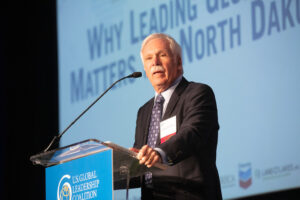
April 18, 2023 — Google CEO Sundar Pichai on Sunday called for increased regulation of artificial intelligence, warning that the rapidly developing technology poses broad societal risks.
“The pace at which we can think and adapt as societal institutions compared to the pace at which the technology’s evolving — there seems to be a mismatch,” Pichai said in an interview with CBS News.
Watch Broadband Breakfast on April 26, 2023 – Should AI Be Regulated?
What are the risks associated with artificial intelligence deployment, and which concerns are just fearmongering?
Widespread AI applications could lead to a dramatic uptick in online disinformation, as it becomes increasingly easy to create and spread fake news, images and videos, Pichai warned.

Google recently released a series of recommendations for regulating AI, advocating for “a sectoral approach that builds on existing regulation” and cautioning against “over-reliance on human oversight as a solution to AI issues.”
But the directive also noted that “while self-regulation is vital, it is not enough.”
Pichai emphasized this point, calling for broad multisector collaboration to best determine the shape of AI regulation.
“The development of this needs to include not just engineers, but social scientists, ethicists, philosophers and so on,” he said. “And I think these are all things society needs to figure out as we move along — it’s not for a company to decide.”

Republicans call to ban members of Congress from personal TikTok use
A group of Republican lawmakers on Monday urged the House and Senate rules committees to ban members of Congress from using TikTok, citing national security risks and the need to “lead by example.”
Congress banned use of the app on government devices in late 2022, but several elected officials have maintained accounts on their personal devices.
In Monday’s letter, Republican lawmakers argued that the recent hearing featuring TikTok CEO Shou Zi Chew made it “blatantly clear to the public that the China-based app is mining data and potentially spying on American citizens.”
“It is troublesome that some members continue to disregard these clear warnings and are even encouraging their constituents to use TikTok to interface with their elected representatives – especially since some of these users are minors,” the letter continued.
TikTok is facing hostility from the other side of the aisle as well. On Thursday, Rep. Frank Pallone, D-N.J., sent Chew a list of questions about the app’s privacy and safety practices that House Democrats claimed were left unanswered at the March hearing.
Meanwhile, Montana lawmakers voted Friday to ban TikTok on all personal devices, becoming the first state to pass such legislation. The bill now awaits the signature of Gov. Greg Gianforte — who was one of several state leaders last year to mimic Congress in banning TikTok from government devices.
Nine additional states join DOJ’s antitrust lawsuit against Google
The Justice Department announced on Monday that nine additional states joined its antitrust lawsuit over Google’s alleged abuse of the digital advertising market.
The Attorneys General of Arizona, Illinois, Michigan, Minnesota, Nebraska, New Hampshire, North Carolina, Washington and West Virginia joined the existing coalition of California, Colorado, Connecticut, New Jersey, New York, Rhode Island, Tennessee and Virginia.
“We look forward to litigating this important case alongside our state law enforcement partners to end Google’s long-running monopoly in digital advertising technology markets,” said Doha Mekki, principal deputy assistant attorney general of the Justice Department’s Antitrust Division.
The lawsuit alleges that Google monopolizes digital advertising technologies used for both buying and selling ads, said Jonathan Kanter, assistant attorney general of the Justice Department’s Antitrust Division, when the suit was filed in January.
“Our complaint sets forth detailed allegations explaining how Google engaged in 15 years of sustained conduct that had — and continues to have — the effect of driving out rivals, diminishing competition, inflating advertising costs, reducing revenues for news publishers and content creators, snuffing out innovation, and harming the exchange of information and ideas in the public sphere,” Kanter said.



